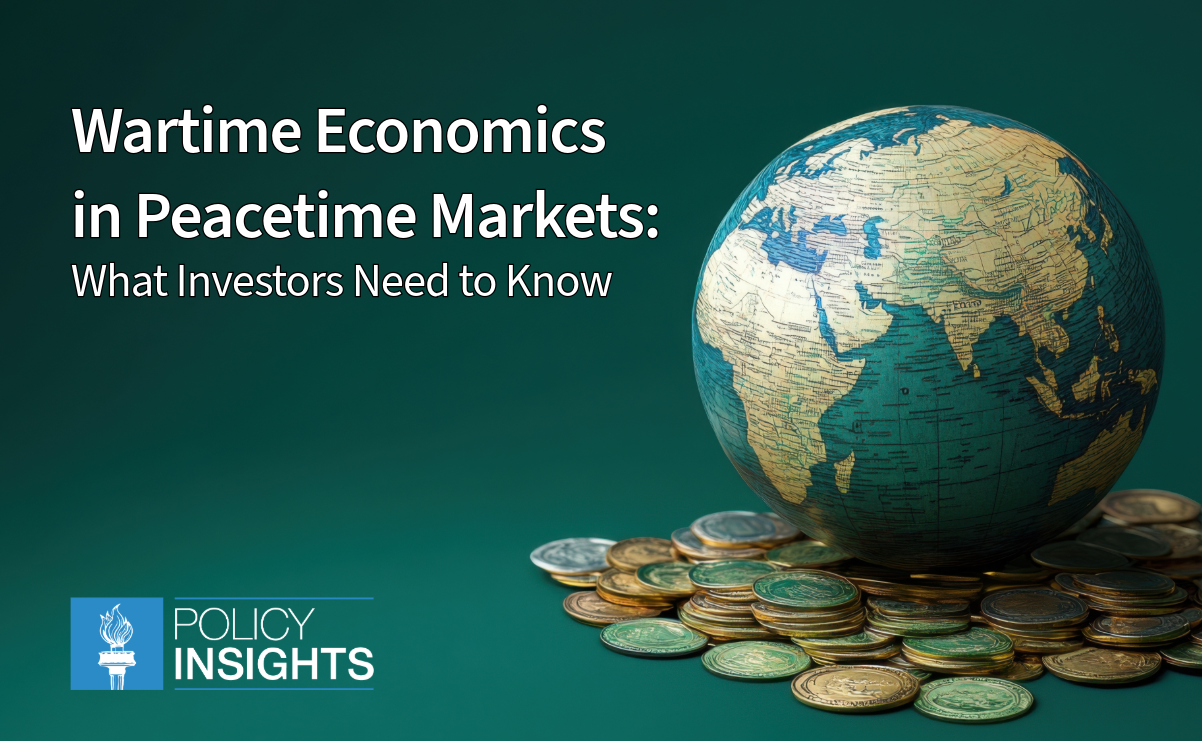






The liberal international order, once underpinned by global economic integration and the principle of comparative advantage, is increasingly being challenged by a return to geoeconomic realism. This paper explores the emerging phenomenon of strategic stockpiling, wherein states seek to secure access to critical minerals and industrial inputs by hoarding, subsidizing domestic production, and weaponizing trade policy. Drawing on recent events—including China’s export controls and the United States’ retaliatory tariffs—this essay argues that we are witnessing a systemic shift from interdependence toward a fragmented, security-driven economic model best described as a “wartime economy.” Implications for policy, industry, and international cooperation are explored with particular attention to Canada’s strategic role within this realignment.
The global economic system, long shaped by the normative assumption that interdependence fosters peace and prosperity, is undergoing profound structural transformation. What was once considered the natural trajectory of liberal globalization—marked by deregulated capital flows, global supply chains, and rules-based trade—is now being supplanted by a securitized framework of economic nationalism. This is particularly evident in the field of critical minerals and strategic commodities, where states are increasingly treating raw materials not as market goods but as tools of national power.
Daniel Ghali, a senior commodity strategist at TD Securities, recently observed that “we are inching closer to a wartime economy”—a characterization that, while provocative, captures the essence of this transformation. Strategic stockpiling, state intervention, and resource protectionism are no longer exceptional policies reserved for moments of existential conflict. They are becoming normalized instruments of peacetime policy under conditions of great power competition and global volatility.
Historically, stockpiling has been associated with military preparedness. The United States National Defense Stockpile, established in 1939, was intended to mitigate supply disruptions during wartime. However, in today’s context, the motives are no longer confined to armed conflict. Rather, they include:
In April 2025, the Chinese government imposed a new round of export restrictions on graphite and rare earths, citing environmental reasons but widely interpreted as a retaliatory measure amid escalating tensions with the United States. In response, the U.S. government imposed a 50 percent tariff on copper imports and invoked the Defense Production Act to accelerate domestic extraction and refining capabilities. These actions mark a significant departure from neoliberal orthodoxy, illustrating how trade and industrial policy are being subordinated to strategic considerations.
Europe has followed suit. Germany and France, through new EU regulations, have begun funding national mineral reserves and incentivizing onshore processing. Canada, too, has accelerated efforts to implement its Critical Minerals Strategy, with the goal of becoming a trusted supplier to allied economies while retaining domestic value-added capabilities.
What we are witnessing is the reassertion of the territorial economy—a concept articulated by historian Charles Maier to describe a political-economic system in which national borders and geostrategic imperatives once again take precedence over global efficiency. Unlike the global economy of the post-Cold War era, the territorial economy privileges resilience over cost-minimization, redundancy over just-in-time supply, and sovereignty over integration.
This realignment is being driven by several converging forces:
Although the present context does not resemble a conventional war, the methods of competition—tariffs, export bans, investment restrictions, industrial subsidies—mirror those used during wartime mobilization. This can be understood as a form of economic warfare without kinetic conflict, where coercive leverage is exercised through control of markets rather than military force.
Among the most striking developments is the growing centrality of mineral access in national defence planning. Copper, often called “the metal of electrification,” has emerged as a strategic asset, particularly for military vehicles and advanced weapon systems. Similarly, the push for semiconductors and EV battery dominance is reshaping foreign investment policies and industrial alliances.
In this environment, commercial decisions are increasingly shaped by intelligence assessments, sanctions regimes, and alliance dynamics. The result is a dual economy: one governed by markets and another governed by security imperatives.
For Canada—a country endowed with vast reserves of critical minerals, hydrocarbons, and fresh water—the transition to a security-first economy presents both risks and opportunities.
Risks:
Opportunities:
To navigate this complex terrain, Canada must pursue a proactive policy of strategic alignment, embedding itself more deeply in allied supply chains while developing domestic industrial capacity in refining, processing, and advanced manufacturing. Initiatives such as NORAD modernization, the North American Defence Industrial Base revitalization, and the Canada-EU Green Minerals Corridor all offer platforms for such engagement.
The liberal international order is no longer the undisputed framework for global economic relations. The shift toward a wartime economic footing—marked by stockpiling, protectionism, and industrial policy—signals a deeper reconfiguration of global governance norms.
While the transition away from interdependence carries undeniable costs, it also offers a chance to rebuild institutions around shared values of security, sustainability, and sovereignty. Canada, as both a resource superpower and a middle power, must embrace this moment not as a threat but as a strategic inflection point.
Goran Samuel Pesic is the President & CEO of the Samuel Group of Companies, a North American advisory firm with offices in Washington, D.C., and Ottawa. He also serves as Chairman of the Policy Insights Forum, a non-partisan Canadian think tank focused on national security, disruptive technologies, the interplay between the economic environment, and global affairs. He regularly advises industry and government on defence procurement, economic resilience, and international policy strategy.